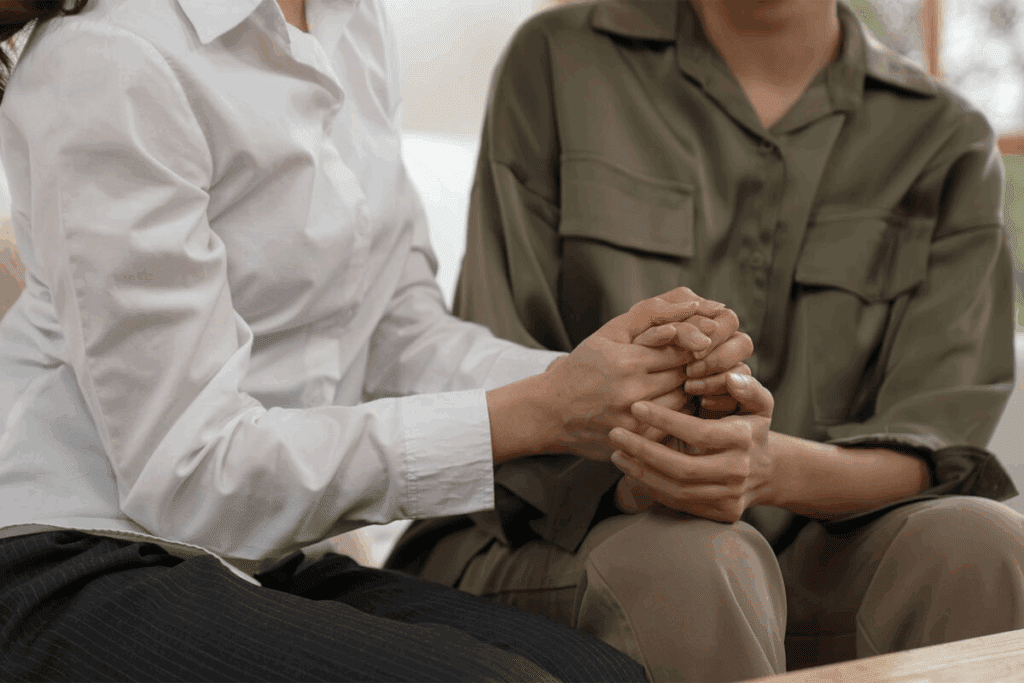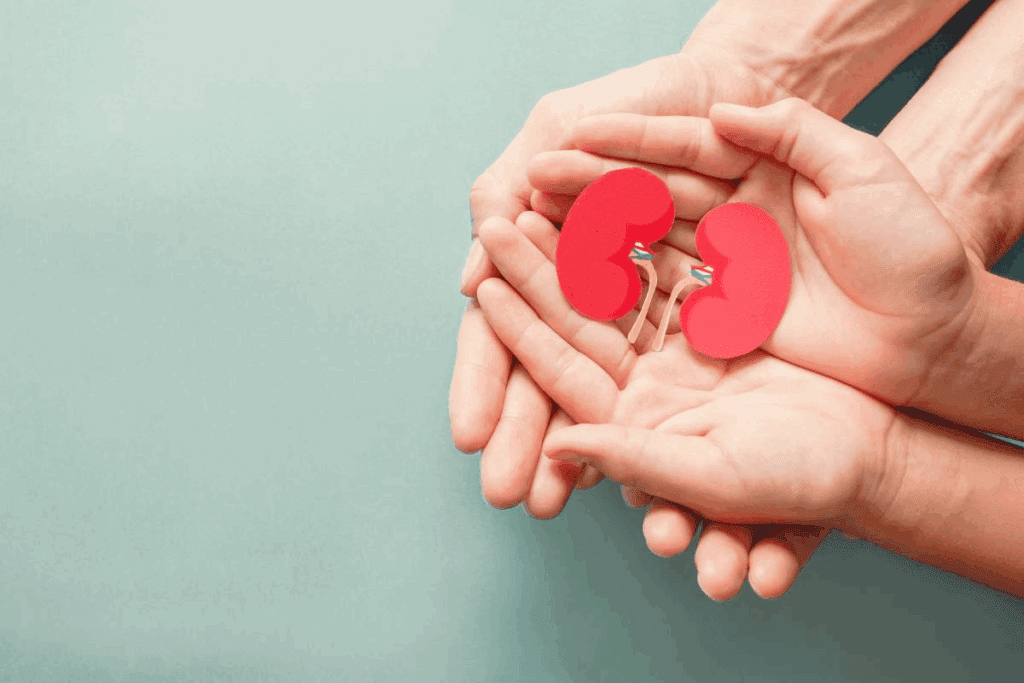Last Updated on October 31, 2025 by Bilal Hasdemir

Kidney stones are often seen as painful but not deadly. But, in rare cases, they can cause serious problems. These include infection, sepsis, or kidney failure. These can be life-threatening if not treated right away can someone die from kidney stones.
Kidney stones, or urolithiasis, affect many people worldwide. About 1 in 10 men will get them at some point. While they’re usually not fatal, knowing the risks and complications is key for both patients and doctors.
At Liv Hospital, we focus on top-notch, ethical healthcare. We take seriously the dangers linked to kidney stones.

Kidney stones are a common health issue that can happen to anyone. They can affect people of all ages and backgrounds. Some lifestyle choices can raise your risk. Globally, kidney stones cause about 19,000 deaths each year. This shows that, though rare, kidney stones can be fatal.
Kidney stones are hard, mineral-based deposits that form in the kidneys. They often relate to what we eat and drink. Dietary factors like too much sodium, animal protein, and foods high in oxalate can up your risk.
The process of stone formation involves several factors. These include how concentrated your urine is, the presence of substances that form stones, and not drinking enough water. Knowing these factors helps prevent stones.
The symptoms of kidney stones vary based on the stone’s size and location. You might feel severe pain in your back or side, nausea, vomiting, and sometimes fever and chills if there’s an infection. Severe pain that spreads from the flank to the groin often leads people to see a doctor.
Doctors use imaging tests like ultrasound or CT scans to see the stones and check for any blockages or complications. Knowing what the stone is made of is also key for treatment and prevention.
While kidney stones are common, the chance of dying from them is low. Yet, some groups face a higher risk. Understanding kidney stones is the first step to managing and preventing serious issues.

Kidney stones are usually not deadly, but they can be in some cases. It’s important to know the risks and complications to understand the situation fully.
Dying from kidney stones is rare, but it can happen. Serious problems can occur, like a blockage in the urinary tract. This blockage can cause infections, like sepsis, which is very dangerous if not treated quickly.
“Sepsis is a major concern in patients with kidney stones,” as it can cause rapid deterioration and even death.
We look at the risks of fatal outcomes from kidney stones. A big risk is sepsis from a urinary tract infection. If the infection gets into the blood, it can cause septic shock, which is very deadly.
About 15% of adults will get kidney stones at some point. In 2015, there were 22.1 million cases worldwide, leading to around 16,100 deaths. These numbers show how serious kidney stone complications can be.
While deaths from kidney stones are rare, they can happen. This is more likely if complications are not treated quickly or well. Risks include big stones, health problems, and late medical help.
Key risk factors for fatal outcomes include:
Knowing these risks helps in preventing them and getting medical help when needed.
Kidney stones affect people worldwide, leading to a high mortality rate. It’s important to know the global numbers to tackle this health problem. This knowledge helps us find ways to prevent and treat kidney stones better.
Every year, about 19,000 people die from kidney stones globally. This shows how big of a health issue kidney stones are. In the West, from 1999 to 2013, there were 1954 deaths, averaging 130 deaths per year.
The global number is much higher. This highlights the need for more research and health programs.
In the U.S., the number of deaths from kidney stones is lower than globally. But it’s a big health worry. Looking at these trends helps us see how well healthcare is working. It also shows where we can do better.
Kidney stones are serious, but they don’t cause as many deaths as heart disease or cancer. Yet, because they’re so common, even a low death rate means a lot of lives lost. This shows why we must keep working on preventing and treating kidney stones.
Kidney stone deaths are linked to many things, like where you live, your health care access, and your health. By studying global numbers and trends, we can tackle this problem. We aim to lower the death toll from kidney stones.
If kidney stones are not treated, they can cause serious problems. We will look at the dangers of ignoring kidney stone treatment.
Untreated kidney stones can lead to urinary tract infections (UTIs). These infections can cause sepsis, a deadly condition. Sepsis is a life-threatening condition that happens when the body overreacts to an infection.
When a kidney stone blocks the urinary tract, it helps bacteria grow. This raises the risk of UTIs. If these infections are not treated quickly, they can turn into sepsis. This is a condition that needs urgent medical care.
Untreated kidney stones can also cause acute kidney injury (AKI) or renal failure. A stone blocking the urine flow can damage the kidney. This can lead to waste buildup in the blood.
In severe cases, this can lead to renal failure. This might need dialysis or a kidney transplant.
Another serious problem is urinary tract obstruction. When a stone blocks the urinary tract, it can stop urine flow. This causes severe pain and can harm the kidney.
Prolonged obstruction can lead to chronic kidney damage. It also raises the risk of infections and other problems.
In conclusion, ignoring kidney stones can lead to severe and even deadly complications. It’s important for those with symptoms to get medical help right away. This can prevent these serious conditions.
Some groups face a higher risk of serious kidney stone problems. It’s important to know who these groups are. We’ll look at what makes them more at risk.
People with diabetes, high blood pressure, and heart disease are at greater risk. These conditions can make treatment harder and raise the chance of bad outcomes. Managing these conditions well is key to avoid serious problems.
People with spinal cord injuries are also at high risk. Their condition can lead to urinary stasis and a higher chance of urinary tract infections. Regular checks and preventive steps are vital for them.
Key risks for those with spinal cord injuries include:
Those with big stone burdens face a high risk of severe problems, like blockage and infection. The size and location of the stones can make treatment harder and increase the risk of death. Quick action is needed to avoid these issues.
The elderly and those with weakened immune systems are very vulnerable. Their lower immune function and possible health issues make them more likely to get severe infections and other problems. Close monitoring and timely action are essential for them.
The main factors that increase risk in these groups are:
Knowing the warning signs for kidney stone complications is key. It can help avoid serious issues. Spotting these signs early is vital for quick action.
Some symptoms suggest a higher risk of kidney stone problems. These include:
If you notice any of these, get medical help right away:
Quick medical check-ups are vital to avoid serious issues.
Sepsis and kidney failure are serious and can be deadly. Sepsis signs include:
Kidney failure signs are:
Knowing these signs helps take action early. This can prevent severe problems.
Medical treatments are key in stopping deaths from kidney stones. Quick and right treatment cuts down the chance of serious harm. We’ll look at the different treatments, like emergency care, surgery, and handling complications.
For serious kidney stone cases, fast emergency care is needed to avoid more problems. Shockwave lithotripsy (SWL) is a safe and effective way to treat stones. Emergency care might also include nephrostomy or stent to stop infections.
When kidney stones are hard to treat, surgery is an option. Ureteroscopy and Percutaneous Nephrolithotomy (PCNL) are two surgeries to remove stones. They work well for stones that block or cause infection.
| Procedure | Description | Effectiveness |
| Shockwave Lithotripsy (SWL) | Non-invasive, uses shockwaves to break stones | Highly effective for small to medium stones |
| Ureteroscopy | Minimally invasive, involves passing a scope through the urethra | Effective for stones in the ureter or kidney |
| Percutaneous Nephrolithotomy (PCNL) | Involves making a small incision to remove stones directly | Effective for large or complex stones |
Severe problems like sepsis and acute kidney injury need quick medical help. Treatment includes fast antibiotics for infections and care to keep kidneys working. Sometimes, dialysis is needed to help kidneys during the crisis.
Getting medical help fast is vital to avoid serious kidney stone problems. Waiting too long can cause big issues, like sepsis and kidney failure. We stress the need to seek medical help right away if symptoms get worse.
Medical technology has changed how we treat kidney stones, cutting down on deaths. We’ve seen big changes in how we find and treat kidney stones. This has led to better results for patients and fewer problems.
Treatment for kidney stones has changed a lot. Now, we use less invasive methods instead of old surgeries. Shockwave lithotripsy is a big part of this, breaking stones without surgery.
Ureteroscopy is another key method. It uses a small scope to see and treat stones in the ureters or kidneys. These new ways have cut down recovery times and risks from old surgeries.
New ways to diagnose kidney stones have helped a lot. Advanced imaging technologies like CT scans and ultrasound help doctors find and understand stones better. This leads to better treatment plans.
These tools also help catch problems early. This means doctors can act fast to stop serious issues. By knowing who’s at high risk, doctors can give better care, lowering death rates.
Less invasive procedures have greatly lowered death rates from kidney stones. Percutaneous nephrolithotomy (PCNL) is one example. It treats big stones safely and effectively. This has led to better results and fewer risks.
These new treatments also mean patients can go home sooner and recover faster. As technology keeps improving, we’ll see even more progress in treating kidney stones.
Understanding and using prevention strategies is key to lowering kidney stone risks. By being proactive, people can greatly lower the chance of serious problems.
Diet changes are vital in preventing kidney stones. Drinking more water is very effective because it dilutes urine and lowers mineral concentration. Also, eating less sodium and avoiding foods high in oxalate, like spinach, helps.
Eating a balanced diet with lots of fruits, veggies, and whole grains also helps prevent stones.
Drinking enough water is key to preventing kidney stones. It helps flush out minerals and lowers stone risk. Changing your lifestyle also helps, like staying healthy and active.
Also, not eating too much animal protein and cutting down on sugary drinks can help prevent stones.
For those at high risk of kidney stones, medical steps are needed. Medications like thiazide diuretics can help by lowering urine calcium. Potassium citrate may also be given to prevent certain stones.
Regular check-ups with a doctor are important to manage and prevent stones from coming back.
For those who’ve had kidney stones before, regular monitoring is key to prevent them from coming back. This includes tests, urine analysis, and doctor visits.
By keeping an eye on their health, people can spot problems early and take action to avoid serious issues.
It’s important for both patients and healthcare providers to know about kidney stone risks. Kidney stones are usually not deadly, but they can cause serious problems if not treated. We’ve looked at how severe kidney stones can be, global death rates from them, and dangerous complications from untreated stones.
Death from kidney stones is rare but serious, mainly for those with many health issues, spinal cord injuries, or the elderly. It’s key to know the signs that mean you need to see a doctor right away to avoid fatal outcomes.
By understanding these risks and taking steps to prevent them, we can lower the chance of serious problems. Thanks to medical progress, death rates from kidney stones have dropped a lot. Awareness and education are vital to keep these risks down. So, can a kidney stone kill you? The risk is small, but knowing the facts is the first step to prevention and timely treatment.
Yes, though rare, kidney stones can be deadly. This usually happens when severe complications like urinary tract infections or blockages occur.
About 19,000 people die from kidney stones each year worldwide. It shows how important it is to know the risks and prevent them.
Certain groups face higher risks. These include people with many health issues, those with spinal cord injuries, and the elderly. Also, those with weakened immune systems are at greater risk.
Look out for severe pain, fever, and vomiting. Also, signs of sepsis or kidney failure need quick medical help to avoid serious problems.
New treatments and diagnostic tools have greatly reduced deaths from kidney stones. They help improve patient care and lower risks of complications.
Making dietary changes and staying hydrated are key. For those at high risk, medical prevention is important. Regular check-ups for those prone to stones also help.
Yes, untreated kidney stones can lead to severe issues. These include sepsis, kidney injury, or blockages, which can be fatal.
Watch for severe pain, trouble urinating, fever, chills, and blood in urine. These signs mean you should see a doctor right away.
Yes, emergency care for severe cases is vital. Surgery for complex stones and managing serious complications can prevent death.
Subscribe to our e-newsletter to stay informed about the latest innovations in the world of health and exclusive offers!
WhatsApp us